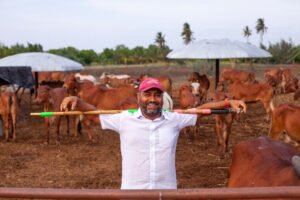Tuesday, 17 February 2026
Mackay pilot plant set to fast-track Australia’s novel food ingredients production
This project is part of an overall $16 million upgrade to the facility to be completed this year which will transform the pilot plant into Australia’s leading physical containment level…

This project is part of an overall $16 million upgrade to the facility to be completed this year which will transform the pilot plant into Australia’s leading physical containment level 2 (PC2) large-scale food-grade research translation facility
A $3.9 million project will complete the transformation of the QUT Mackay Renewable Biocommodities Pilot Plant (MRBPP) into a state-of-the-art food-grade compliant facility which will enhance Australia’s ability to produce novel food ingredients.
Professor Ian O’Hara, who led the development of the Mackay Renewable Biocommodities Pilot Plant (MRBPP) more than a decade ago, said the co-investment between QUT and Australia’s Food and Beverage Accelerator (FaBA) would significantly expand the facility’s capability and allow companies to fast-track product development in the food and beverage sector.
“This project is part of an overall $16 million upgrade to the facility to be completed this year which will transform the pilot plant into Australia’s leading physical containment level 2 (PC2) large-scale food-grade research translation facility,” Professor O’Hara said.
“This will enable the production of novel food and beverage ingredients via precision fermentation and boost product development by providing a unique capability to undertake early-stage scale-up, reducing cost and timeframes for getting new products to market.
“Precision fermentation allows us to manufacture new high-value food ingredients like proteins that can boost our bioeconomy in Australia and provide new domestic and export opportunities for our agricultural and food and beverage industries.”
The QUT research team involved in the project includes Professor O’Hara, Professor Jolieke van der Pols, Associate Professor Mark Harrison and Dr Jo Blinco.
Precision fermentation is a technology that allows us to convert sugars into a range of other food ingredients and products in brewery-style fermentation tanks.
Unlike traditional fermentation, which is used to make products such as beer and yoghurt, precision fermentation tunes the microorganisms to produce specific enzymes, fats or proteins and allows us to do this at a large scale.
“Australia has many of the ingredients for a successful precision fermentation ecosystem,” Professor O’Hara said.
Technology
Setting the Standard for Sustainable Ingredients
Feb 16, 2026 | Ingredients
Chiquita Advances Banana Innovation with Completion of Yelloway Banana Pan-Genome
Feb 13, 2026 | Company News
Food Testing
Redefining Trust in Organic Foods through Independent Testing
Feb 13, 2026 | Food Safety and Testing
AFNOR International Eyes Global Food Safety Growth with HACCP Group Takeover
Feb 04, 2026 | Australia
More Popular
India’s Nutraceutical Sector Poised for Tenfold Growth over Pharmaceuticals: FSSAI
Feb 16, 2026 | Events
Saputo Enters Agreement to Divest Majority Stake in its Argentina Operations
Feb 16, 2026 | Company News
JBS Inaugurates New Plant in Saudi Arabia
Feb 16, 2026 | Company News





